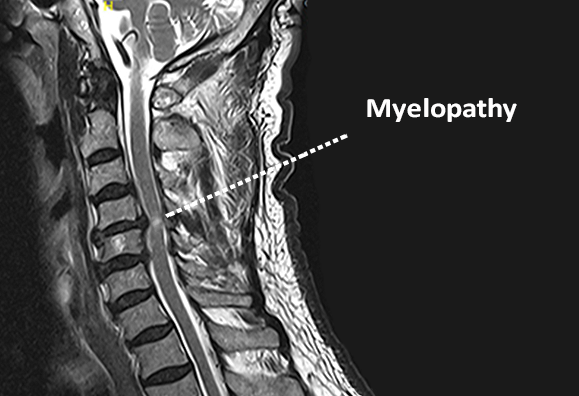Myelopathy
Myelopathy means “dysfunction of the spinal cord”. Myelopathy is a result of untreated stenosis of the spinal canal that exerts prolonged pressure on the spinal cord. The most common causes of spinal stenosis are degenerative arthritis of the spine, disc degeneration, disc herniation, bone spur formation and kyphosis, the bending of the neck forward caused by osteoporosis. Myelopathy commonly occurs in the cervical spine and only occasionally in the thoracic region. In addition “dynamic myelopathy” may occur when instability causes the movement of bones in the spine.
Left untreated, the constant pressure from stenosis can, over time, result in bruising of the spinal cord. This bruising affects the long fibers in the spinal cord that transmit impulses to the arms legs and hands. The compression of the spinal cord results in two types of injury. First, the pressure reduces the blood flow in the spinal cord, chronically starving cells of oxygen and nutrients. Second, it causes inflammation, which probably occurs as a result of cell death and contributes to further damage.

Myelopathy can affect the entire spinal cord, unlike other types of back problems where pain is localized to a specific area. Unlike conditions that compress nerve roots, myelopathy can cause nerve dysfunction or neurological deficit along the spinal cord. Myelopathy can either “ascend” along the spinal cord to the head, or “descend” along the spinal cord to the hips. The spinal cord has limited ability to fix its diseased or damaged nerves, in contrast to the peripheral nervous system. Left untreated, myelopathy can cause permanent spinal injury leading to significant nerve damage including paralysis. Myelopathy is progressive, so the earlier you seek treatment for conditions that may result in myelopathy, such as spinal stenosis, herniated disc, etc. the better.
What Causes Myelopathy
Aging leads to wear and tear on the spine. With age, the intervertebral discs become less spongy and lose water content. This can lead to reduced disc height and bulging of the hardened disc into the spinal canal. The bones and ligaments of the spinal joints thicken and enlarge due to arthritis, also pushing into the spinal canal. Disc degeneration can also lead to the formation of bone spurs, which can narrow the spinal canal and compress the spinal cord.
Spinal myelopathy may also occur as a result of an untreated spinal condition caused by a car accident or fall.
Myelopathy Symptoms
Myelopathy symptoms occur gradually and may initially mirror those of other degenerative spine conditions. The symptoms may begin as numbness, but then can progress to dexterity and balance problems and neurological deficit. Some indicators that you may be suffering from myelopathy include:
- Radiculopathy
- Neck pain
- Gait or balance problems
- Difficulty performing fine motor skills
- Loss of coordination
- Muscle weakness
For some, everyday tasks may become harder, such as putting on shoes and walking up stairs.
Myelopathy Treatment
If you have been diagnosed with spinal cord compression giving rise to the symptoms of myelopathy, and if these symptoms have been present for more than 12 weeks, you may require surgical treatment. Without treatment, myelopathy is invariably progressive, and the resultant neurological dysfunction is likely to become irreversible. The reason for this is simply that the spinal cord has very poor capacity for repair, and any damage done to the spinal cord as a consequence of pressure on it, is usually permanent. Surgery is therefore often done to relieve pressure on the spinal cord, prevent neurological deterioration, and preserve the current level of function.
To treat patients with a diagnosis of myelopathy, the surgeons at The Bonati Spine Institute may perform an array of procedures to treat the condition(s) that is compressing the spinal cord. These procedures are performed to remove the pressure off of the spinal cord and stop the progression of myelopathy and improve neurological function.
For over 30 years the spine surgeons at The Bonati Spine Institute have helped patients find relief from their spinal conditions. The spine surgeons at The Bonati Spine Institute can diagnose whether you have myelopathy using Magnetic Resonance Imaging (MRI) and recommend the best treatment options. Call (855)267-0482 for a an MRI review.
We encourage you to contact us to for an MRI review or a discussion with one of our medical professionals. Find out why The Bonati Spine Procedures are considered to be among the world’s best solutions for spine problems.
